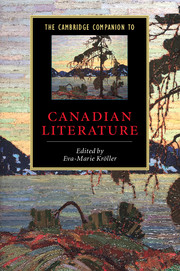Book contents
- Frontmatter
- Introduction
- 1 Aboriginal writing
- 2 Francophone writing
- 3 Exploration and travel
- 4 Nature-writing
- 5 Drama
- 6 Poetry
- 7 Fiction
- 8 Short fiction
- 9 Writing by women
- 10 Life writing
- 11 Regionalism and urbanism
- 12 Canadian literary criticism and the idea of a national literature
- Further reading
- Index
- Series List
1 - Aboriginal writing
Published online by Cambridge University Press: 28 May 2006
- Frontmatter
- Introduction
- 1 Aboriginal writing
- 2 Francophone writing
- 3 Exploration and travel
- 4 Nature-writing
- 5 Drama
- 6 Poetry
- 7 Fiction
- 8 Short fiction
- 9 Writing by women
- 10 Life writing
- 11 Regionalism and urbanism
- 12 Canadian literary criticism and the idea of a national literature
- Further reading
- Index
- Series List
Summary
Transformations of oral traditions
In September 1838, Peter Jones (Kahkewaquonaby), an ordained Ojibway Methodist minister, presented a petition to Queen Victoria from chiefs of the Mississauga Ojibway community at Credit River, where he had lived with his mother for the first fourteen years of his life. The petition asked that the Credit River community be granted the title deeds that would ensure their lands could never be taken away. Kahkewaquonaby had written the chiefs' message in the roman alphabet, and they had signed it pictographically with their clan emblems. Attached to the document were some strings of wampum that Kahkewaquonaby read for the queen, as well as delivering his own oral supplication in support of the chiefs' request. Consisting of three forms of writing, and two kinds of oral utterance, the petition was a multimedia event, not merely a written text that could be trusted to speak for itself. Kahkewaquonaby's bodily presence, dressed in buckskin and moccasins, was necessary to authenticate and authorize the petition, to witness that it had been received, and to guide the queen's interpretation of the document in a manner most likely to ensure a favorable outcome for the Credit River Ojibway community.
- Type
- Chapter
- Information
- The Cambridge Companion to Canadian Literature , pp. 22 - 48Publisher: Cambridge University PressPrint publication year: 2004
- 1
- Cited by

